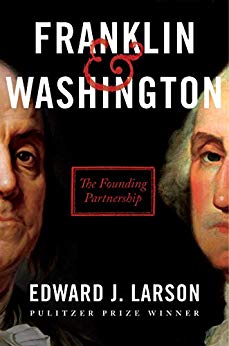Book Review: Franklin & Washington: The Founding Partnership by Edward J. Larson
Disclaimer: I received a copy of this book through a Goodreads giveaway for the purpose of writing this review. No other compensation was offered or requested.
A dual biography of Benjamin Franklin (1705-1790) and George Washington (1732-1799) is, I will state right up front, is a good idea. Both men were instrumental in moving the American Colonies from loyal but disgruntled subjects of the British Crown to the United States of America, an independent country with its own constitution chosen by those who lived there. This volume details the times these friends cooperated, and some of their differences.

The first point of concentration is the French and Indian War, in which both Franklin and Washington worked to protect their individual colonies, but found common ground and began corresponding.
Both men were industrious, and self-made at the beginning. Washington, however, only a few years into adulthood became considerably wealthier by inheritance as a series of family deaths wiped out his close relatives. Having started industrious, he then worked to make his plantation more successful, as well as becoming known as a soldier and leader of men when his colony needed him.
The book talks about how the men became disillusioned with British rule, both in general, and due to personal slights. Franklin was more diplomatic by nature, and spent quite some time abroad, first in England trying to mitigate the various taxes imposed after the Seven Years’ War, and during the American Revolution, convincing the French to support the rebelling colonies.
Meanwhile, George Washington became General Washington, leading the American troops through many lean years of hardship until the British occupation was finally broken.
After the war ended, both Franklin and Washington had learned the dangers of too little coordination between the colonies, jealous of their own prerogatives. The once vibrant Continental Congress had most of its best people move on to military service or their individual state governments, while petty men served in the broader congress. The Articles of Confederation gave each new state its own full powers, which meant that they could starve the national government and refuse to pay the veterans of the revolution on time.
A better government was needed, and so a convention was called to amend the Articles of Confederation, which turned into the creation of the American Constitution. Franklin was elderly and nearly bedridden by this point, but still managed to show up (the meeting hall wasn’t too far from his house) and help out, while Washington presided over the convention. It was pretty obvious that George Washington was the only one to be trusted as head of the new government, so his ideas were also listened to.
But one of the big differences between Franklin and Washington was their attitudes towards slavery. In his early career, Benjamin Franklin owned slaves, because that was how you got ahead in business, but exposure to Quaker ideas and abolitionism through his printing business caused Franklin to realize the moral implications of the practice. (Plus he’d been an indentured servant once, so didn’t buy the “benevolent master” argument.) He freed his own slaves and urged others to do the same, eventually founding a major Abolitionist society.
Meanwhile, George Washington came from the planter class of Virginia. Although he seems to have begun realizing the immorality of slavery sometime during the American Revolution due to interacting with free black people, Washington kept his reservations private. He needed slaves economically, and reacted badly to anyone who disrespected him including slaves who ran away.
Thus, Washington was not thrilled when Franklin sent a petition to the first Congressional session of the new United States, one of several that asked the government to restrict the slave trade, and even ban slavery altogether. The protections in the Constitution for slavery had been a hard-fought compromise, and President Washington didn’t want the country torn apart again. (Congress kicked the can down the timeline to 1808, the first time allowed under the Constitution for restriction of the slave trade.)
George Washington freed his own slaves in his will…to take effect after the death of his wife. Martha Washington, realizing that this was an open invitation to kill her, freed them early, but not her own slaves. Anti-slavery people took this as a sign that Washington had meant for slavery to end altogether at some point, while pro-slavery people saw it as just a nice private gesture that did not set a precedent for themselves.
There’s a center section of color pictures, extensive endnotes, and a full index.
Because the focus is on the connection between the two men and where their interests coincided and diverged, other portions of their lives get much less focus. So while I do recommend this well-researched book to the student of American history, you’ll also want to read individual biographies of those involved to get a fuller picture.

